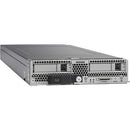Description
The Cisco B200 M4 Blade Server is designed to deliver enterprise-class performance, scalable memory, and flexible I/O for data centers and remote sites. Built as part of the Cisco UCS B-Series, this blade brings together proven reliability, strong virtualization support, and streamlined management in a compact half-height form factor. With dual Intel Xeon E5-2683 v3 processors at 2.0 GHz and 256 GB of RAM, the B200 M4 is ready to handle demanding workloads—from web infrastructure and application servers to distributed databases and virtualized environments—while maximizing rack density and minimizing footprint.
Engineered for efficiency and agility, the B200 M4 Blade Server combines robust compute with a flexible I/O backbone. It is designed to fit seamlessly into Cisco UCS chassis and to be managed alongside other UCS blades through Cisco UCS Manager, enabling policy-based automation, simplified firmware updates, and rapid serviceability. This blade is an ideal building block for scalable data center architectures, offering consistent performance, predictable behavior, and centralized control—critical factors for modern deployments that demand reliability and operational efficiency.
With its 2 x Intel Xeon E5-2683 v3 processors, the B200 M4 delivers strong multi-threaded performance for virtualization, database workloads, and dense web services. The generous 256 GB RAM configuration provides ample headroom for virtualization platforms, in-memory databases, and large-scale caching, reducing the need for frequent memory upgrades as workloads grow. The 12Gb/s SAS controller supports high-speed storage connectivity, enabling fast data access for boot drives, local SSDs, and high-performance SAS/SATA arrays within a blade chassis. The result is a balance of compute, memory, and I/O throughput that supports a broad set of applications while keeping operational costs in check.
Beyond raw hardware, the B200 M4 is anchored by Cisco’s UCS management philosophy. This blade is designed to work in harmony with UCS Manager and the broader UCS ecosystem, offering streamlined lifecycle management, centralized policy enforcement, and simplified provisioning for bare-metal, virtual machines, and containerized workloads. For IT teams, that means consistent deployments, fewer manual steps, and greater predictability when scaling out the data center. The blade’s compatibility with Cisco’s ecosystem also translates into easier interoperability with networking, storage, and fabric components, helping organizations reduce integration risk and accelerate time to value.
- High-density compute: Dual Intel Xeon E5-2683 v3 processors at 2.0 GHz deliver solid throughput for compute-intensive workloads while fitting into a compact blade form factor.
- Significant memory footprint: 256 GB of RAM supports large virtual machines, in-memory databases, and caching layers, enabling more workloads per blade and smoother performance under load.
- Flexible I/O and storage support: A 12Gb/s SAS Controller provides fast storage connectivity, supporting high-throughput data access for local drives and integrated storage options within the UCS chassis.
- Unified management with UCS: Seamless integration with Cisco UCS Manager enables policy-driven automation, consistent firmware updates, and simplified lifecycle management across the blade pool.
- Optimized for data centers and remote sites: Designed for efficiency, density, and remote deployment scenarios, the B200 M4 helps reduce rack footprint while delivering enterprise-class capabilities.
Technical Details of Cisco B200 M4 Blade Server
- Processors: 2 x Intel Xeon E5-2683 v3, 2.0 GHz
- Memory: 256 GB RAM
- Storage Controller: 12Gb/s SAS Controller
- Form Factor: Cisco UCS B-Series Blade Server (half-height blade)
- Management: Compatible with Cisco UCS Manager for policy-based automation and centralized control
How to Install Cisco B200 M4 Blade Server
- Prepare your Cisco UCS environment: Ensure the UCS chassis has power and fabric interconnects configured, and verify UCS Manager access for blade provisioning.
- Power down and rack the blade: With proper grounding and rack space, insert the B200 M4 blade into an available slot within the Cisco UCS chassis.
- Connect management and network: Attach the blade to management networks and fabric interconnects as defined in your UCS policy. Configure mezzanine and flexible LOM options if needed for your workload.
- Install and configure firmware and BIOS settings: Use UCS Manager to apply baseline firmware, update to the required versions, and set BIOS/boot policies aligned with your deployment standards.
- Provision the operating environment: Deploy the desired operating system or virtualization platform through UCS Manager, assign resources, and implement any required storage and networking policies for consistent, repeatable deployments.
- Validate and monitor: Power on, verify hardware status, confirm network reachability, and monitor performance through UCS Manager dashboards to ensure the blade operates within defined SLAs.
Frequently asked questions
- What is the CPU configuration? The Cisco B200 M4 features dual Intel Xeon E5-2683 v3 processors running at 2.0 GHz, delivering strong essential compute performance for enterprise workloads.
- How much memory does this blade include? The configuration shown includes 256 GB of RAM, providing ample capacity for virtualization, large databases, and memory-intensive applications.
- What type of storage controller is included? The blade is equipped with a 12Gb/s SAS Controller, enabling high-speed connection to SAS storage options within the UCS environment.
- Is this blade managed within Cisco UCS Manager? Yes. The B200 M4 is designed to be managed as part of the Cisco UCS ecosystem, enabling policy-based automation, simple provisioning, and centralized firmware updates.
- What workloads is the B200 M4 best suited for? It is well-suited for web infrastructure, virtualization host roles, distributed databases, line-of-business applications, and other demanding enterprise workloads that benefit from high density, reliable performance, and centralized management.
- What deployment scenarios benefit most from this blade? Data center consolidations, remote sites with centralized management, and scalable UCS-based architectures where density, efficiency, and predictable performance are priorities.
Customer reviews
Showing - Of Reviews


